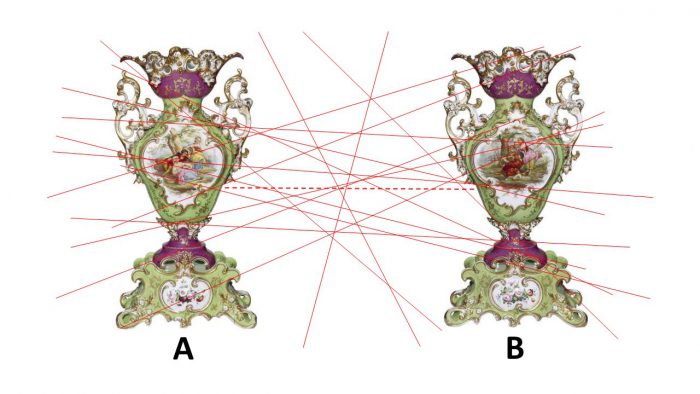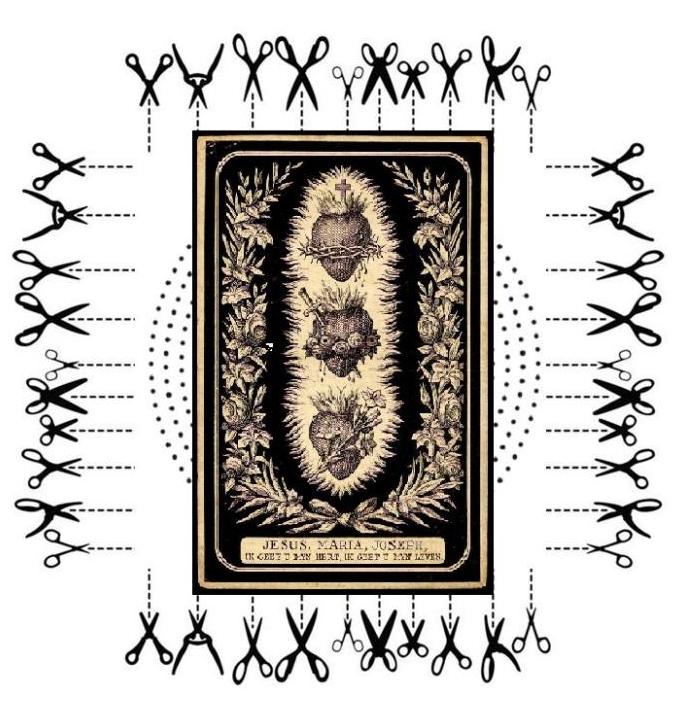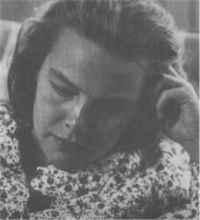Fleurs du Mal Magazine


Or see the index

O KIND’REN
VAN MIJN DROOMEN
O kind’ren van mijn droomen,
O bloemkens van mijn tuin,
Wat buigt ge droef en loome
Uw teng’re kopkens schuin…
Ge waart zo frisch te voren
Als klokskens van de Mei,
O lievekens, geboren
Uit droom en mijmerij…
En ‘k heb u, stil-bewogen,
Gevoed, bij nacht en dag,
Met regen van mijn oogen,
Met zonne van mijn lach.
Ik wil u niet zien welken;
Ge moet herleven nog.
O liefde…, warm die kelken,
O zonne…, zoen ze toch,
En koester, lieve, goede
Mijn zielekind’ren weêr;
Ik kan ze niet meer voeden:
‘k Heb geen illuzies meer.
Alice Nahon
(1896-1933)
O Kind’ren van mijn Droomen
• fleursdumal.nl magazine
More in: Archive M-N, Archive M-N, Nahon, Alice

WEEMOED
Uit de bloemen en de bomen
Stijgt een onbepaalde klacht
‘s Avonds, als ik zit te dromen
En gedwee m’n weemoed wacht.
En uit alle de gewesten
Rijst een zang van droefenis
Omdat ginds in ‘t rode Westen
‘t Zonnelicht aan ‘t sterven is…
‘k Zit naar ‘t sparrenbos te staren,
Waar die stralen stervend zijn;
‘k Wou zo geern’ wat glans vergaren
Voor mijn droevig zielekijn.
Maar ze daalt reeds in de bomen
En haar stralen houdt ze bij,
Z’heeft mijn blijheid meegenomen
En wat weemoed liet ze mij.
Stil, o stille… ‘k Voel ze komen
Milde weemoedsmelodij,
Zachte, wondre weeldestromen
Brengen mij gedichtjes bij.
Stil, o stille, ‘k hoor d’akkoorden
Klagen door de schemering.
‘k Voel geen tranen, ‘k weet geen woorden,
‘k Vind alleen herinnering.
Dank, o zon, dat gij mijn zangen,
Als g’in ‘t leven slapen gaat,
Voor dees grauwe gasthuisgangen
Mild en goed behouden laat.
Dank, o weemoed, dat gij dromen
Zendt door mijne droefenis,
Wijl dees donkere dagen komen
Wijl mijn zon gestorven is…
Alice Nahon
(1896-1933)
Weemoed
• fleursdumal.nl magazine
More in: Archive M-N, Archive M-N, Nahon, Alice

Sérgio Monteiro de Almeida
Poema visual: Pair of vases #1
Sérgio Monteiro de Almeida, Curitiba, Brazil (1964).
Intermedia visual poet and conceptual artist
Sérgio Monteiro de Almeida cv:
Curitiba, Brazil (1964). Intermedia visual poet and conceptual artist. – He has published in numerous anthologies and specialized magazines in Brazil and outside; participated in exhibitions of visual poetry as International Biennial of Visual and Alternative Poetry in Mexico (editions from 1987 to 2010); Post-Art International Exhibition of Visual / Experimental Poetry, San Diego State University-USA (1988); 51 and 53 Venice Biennial (2005 and 2009). – He published in 2007 the book Sérgio Monteiro de Almeida with a global vision about his work as a visual artist and poet. – This book was incorporated into the “Artist Books” collection of the New York City Library (USA). – Author of the CD of kinetic visual poems (EU) NI/IN VERSO (still unpublished). – He presented urban interventions in Curitiba, San Diego, Seattle, New York, Paris, Rome. – In 2014 and 2015 visual poems published in the Rampike experimental literature magazine of the University of Windsor, Canada. – He recently had his poems published in Jornal Candido (n. 64) and Relevo (2015 and 2016), and in 2017 in: fleursdumal.nl magazine for art & literature (www.fleursdumal.nl).
More about his work:
Livro eletrônico http://issuu.com/boek861/docs/sergio_monteiro_libro;
Enciclopédia Itaú Cultural de artes visuais www.itaucultural.com.br;
Videos no Youtube: http://www.youtube.com/user/SergioMAlmeida
Sérgio Monteiro de Almeida
Curitiba – PR – Brazil
email: sergio.ma@ufpr.br
• fleursdumal.nl magazine
More in: #Editors Choice Archiv, *Concrete + Visual Poetry P-T, Archive M-N, Archive M-N, Sérgio Monteiro de Almeida

Sérgio Monteiro de Almeida
Poema visual: Pair of vases #1
Sérgio Monteiro de Almeida, Curitiba, Brazil (1964).
Intermedia visual poet and conceptual artist
Sérgio Monteiro de Almeida cv:
Curitiba, Brazil (1964). Intermedia visual poet and conceptual artist. – He has published in numerous anthologies and specialized magazines in Brazil and outside; participated in exhibitions of visual poetry as International Biennial of Visual and Alternative Poetry in Mexico (editions from 1987 to 2010); Post-Art International Exhibition of Visual / Experimental Poetry, San Diego State University-USA (1988); 51 and 53 Venice Biennial (2005 and 2009). – He published in 2007 the book Sérgio Monteiro de Almeida with a global vision about his work as a visual artist and poet. – This book was incorporated into the “Artist Books” collection of the New York City Library (USA). – Author of the CD of kinetic visual poems (EU) NI/IN VERSO (still unpublished). – He presented urban interventions in Curitiba, San Diego, Seattle, New York, Paris, Rome. – In 2014 and 2015 visual poems published in the Rampike experimental literature magazine of the University of Windsor, Canada. – He recently had his poems published in Jornal Candido (n. 64) and Relevo (2015 and 2016), and in 2017 in: fleursdumal.nl magazine for art & literature (www.fleursdumal.nl).
More about his work:
Livro eletrônico http://issuu.com/boek861/docs/sergio_monteiro_libro;
Enciclopédia Itaú Cultural de artes visuais www.itaucultural.com.br;
Videos no Youtube: http://www.youtube.com/user/SergioMAlmeida
Sérgio Monteiro de Almeida
Curitiba – PR – Brazil
email: sergio.ma@ufpr.br
• fleursdumal.nl magazine
More in: #Archive Concrete & Visual Poetry, *Concrete + Visual Poetry P-T, Archive M-N, EXPERIMENTAL POETRY, Sérgio Monteiro de Almeida

ARMOE
‘k Heb zoo’n honger naar een lied
In dit huis van eenzaam wezen,
Waar ‘k nog in geen blik mocht lezen
Dat een mensch me geren ziet.
‘t Kloksken tikt melankoliek…,
‘t maakt me monotoon en kranke,
God, ik smacht naar dieper klanken,
‘k Heb zoo’n honger naar muziek…
Ach…, En zoo ‘k mezelve sus
Met een blom of een gebêken…
Ziet ge niet mijn lippen smeeken…
‘k Heb zoo’n honger naar een kus!
Leven, dat ik lieven moet,
Leven… kunt ge zoo me laten
Zonder liefde… zonder haten…?
‘k Heb zoo’n honger naar uw gloed.
Alice Nahon
(1896-1933)
Armoe
• fleursdumal.nl magazine
More in: Archive M-N, Archive M-N, Nahon, Alice

Sérgio Monteiro de Almeida
Poema visual: Scissors
Sérgio Monteiro de Almeida, Curitiba, Brazil (1964).
Intermedia visual poet and conceptual artist
Sérgio Monteiro de Almeida cv:
Curitiba, Brazil (1964). Intermedia visual poet and conceptual artist. – He has published in numerous anthologies and specialized magazines in Brazil and outside; participated in exhibitions of visual poetry as International Biennial of Visual and Alternative Poetry in Mexico (editions from 1987 to 2010); Post-Art International Exhibition of Visual / Experimental Poetry, San Diego State University-USA (1988); 51 and 53 Venice Biennial (2005 and 2009). – He published in 2007 the book Sérgio Monteiro de Almeida with a global vision about his work as a visual artist and poet. – This book was incorporated into the “Artist Books” collection of the New York City Library (USA). – Author of the CD of kinetic visual poems (EU) NI/IN VERSO (still unpublished). – He presented urban interventions in Curitiba, San Diego, Seattle, New York, Paris, Rome. – In 2014 and 2015 visual poems published in the Rampike experimental literature magazine of the University of Windsor, Canada. – He recently had his poems published in Jornal Candido (n. 64) and Relevo (2015 and 2016), and in 2017 in: fleursdumal.nl magazine for art & literature (www.fleursdumal.nl).
More about his work:
Livro eletrônico http://issuu.com/boek861/docs/sergio_monteiro_libro;
Enciclopédia Itaú Cultural de artes visuais www.itaucultural.com.br;
Videos no Youtube: http://www.youtube.com/user/SergioMAlmeida
Sérgio Monteiro de Almeida
Curitiba – PR – Brazil
email: sergio.ma@ufpr.br
• fleursdumal.nl magazine
More in: #Archive Concrete & Visual Poetry, *Concrete + Visual Poetry P-T, Archive M-N, EXPERIMENTAL POETRY, Sérgio Monteiro de Almeida

Sérgio Monteiro de Almeida
Poema visual: Pair of vases #2
Sérgio Monteiro de Almeida, Curitiba, Brazil (1964).
Intermedia visual poet and conceptual artist
Sérgio Monteiro de Almeida cv:
Curitiba, Brazil (1964). Intermedia visual poet and conceptual artist. – He has published in numerous anthologies and specialized magazines in Brazil and outside; participated in exhibitions of visual poetry as International Biennial of Visual and Alternative Poetry in Mexico (editions from 1987 to 2010); Post-Art International Exhibition of Visual / Experimental Poetry, San Diego State University-USA (1988); 51 and 53 Venice Biennial (2005 and 2009). – He published in 2007 the book Sérgio Monteiro de Almeida with a global vision about his work as a visual artist and poet. – This book was incorporated into the “Artist Books” collection of the New York City Library (USA). – Author of the CD of kinetic visual poems (EU) NI/IN VERSO (still unpublished). – He presented urban interventions in Curitiba, San Diego, Seattle, New York, Paris, Rome. – In 2014 and 2015 visual poems published in the Rampike experimental literature magazine of the University of Windsor, Canada. – He recently had his poems published in Jornal Candido (n. 64) and Relevo (2015 and 2016), and in 2017 in: fleursdumal.nl magazine for art & literature (www.fleursdumal.nl).
More about his work:
Livro eletrônico http://issuu.com/boek861/docs/sergio_monteiro_libro;
Enciclopédia Itaú Cultural de artes visuais www.itaucultural.com.br;
Videos no Youtube: http://www.youtube.com/user/SergioMAlmeida
Sérgio Monteiro de Almeida
Curitiba – PR – Brazil
email: sergio.ma@ufpr.br
• fleursdumal.nl magazine
More in: #Archive Concrete & Visual Poetry, *Concrete + Visual Poetry P-T, Archive M-N, EXPERIMENTAL POETRY, Sérgio Monteiro de Almeida

Sérgio Monteiro de Almeida
Poema visual: AR_dor (Air_ ache= ardor), for me this is the summary of these pandemic times
Sérgio Monteiro de Almeida, Curitiba, Brazil (1964).
Intermedia visual poet and conceptual artist
Sérgio Monteiro de Almeida cv:
Curitiba, Brazil (1964). Intermedia visual poet and conceptual artist. – He has published in numerous anthologies and specialized magazines in Brazil and outside; participated in exhibitions of visual poetry as International Biennial of Visual and Alternative Poetry in Mexico (editions from 1987 to 2010); Post-Art International Exhibition of Visual / Experimental Poetry, San Diego State University-USA (1988); 51 and 53 Venice Biennial (2005 and 2009). – He published in 2007 the book Sérgio Monteiro de Almeida with a global vision about his work as a visual artist and poet. – This book was incorporated into the “Artist Books” collection of the New York City Library (USA). – Author of the CD of kinetic visual poems (EU) NI/IN VERSO (still unpublished). – He presented urban interventions in Curitiba, San Diego, Seattle, New York, Paris, Rome. – In 2014 and 2015 visual poems published in the Rampike experimental literature magazine of the University of Windsor, Canada. – He recently had his poems published in Jornal Candido (n. 64) and Relevo (2015 and 2016), and in 2017 in: fleursdumal.nl magazine for art & literature (www.fleursdumal.nl).
More about his work:
Livro eletrônico http://issuu.com/boek861/docs/sergio_monteiro_libro;
Enciclopédia Itaú Cultural de artes visuais www.itaucultural.com.br;
Videos no Youtube: http://www.youtube.com/user/SergioMAlmeida
Sérgio Monteiro de Almeida
Curitiba – PR – Brazil
email: sergio.ma@ufpr.br
• fleursdumal.nl magazine
More in: #Archive Concrete & Visual Poetry, *Concrete + Visual Poetry P-T, Archive M-N, EXPERIMENTAL POETRY, Sérgio Monteiro de Almeida

ZAADMAAND
Daar stond een late zonnebloem
Te sterven in de laatste zon;
En niemand in de wereld,
Die haar nog helpen kon.
Een mensenhand gerimpeld
En door geen werk vergroofd,
Die sneed van ‘t mager halske
Dat beu-gebogen hoofd.
En op z’n smalle vingren
Woog het van zaden zwaar.
Ze hebben elkaar bekeken
En hij werd bang van haar.
En schouwend in zich zelve,
Voelend z’n groot verval:
“Zal ik zo prachtig wezen,
Als God mij plukken zal?”
Alice Nahon
(1896-1933)
Zaadmaand
• fleursdumal.nl magazine
More in: Archive M-N, Archive M-N, Nahon, Alice

Ave Maria
Es will das Licht des Tages scheiden;
Nun bricht die stille Nacht herein.
Ach, könnte doch des Herzens Leiden
So, wie der Tag vergangen sein!
Ich leg’ mein Flehen dir zu Füßen;
O, trag’s empor zu Gottes Thron,
Und laß, Madonna, laß dich grüßen
Mit des Gebetes frommem Ton:
Ave, ave Maria!
Es will das Licht des Glaubens scheiden;
Nun bricht des Zweifels Nacht herein.
Das Gottvertrau’n der Jugendzeiten,
Es soll mir abgestohlen sein.
Erhalt’, Madonna, mir im Alter
Der Kindheit frohe Zuversicht;
Schütz’ meine Harfe, meinen Psalter;
Du bist mein Heil, du bist mein Licht!
Ave, ave Maria!
Es will das Licht des Lebens scheiden;
Nun bricht des Todes Nacht herein.
Die Seele will die Schwingen breiten;
Es muß, es muß gestorben sein.
Madonna, ach, in deine Hände
Leg’ ich mein letztes, heißes Fleh’n:
Erbitte mir ein gläubig Ende
Und dann ein selig Aufersteh’n!
Ave, ave Maria!
Karl May
(1842-1912)
Ave Maria
• fleursdumal.nl magazine
More in: Archive M-N, Archive M-N, Karl May

Lullaby
Sleep, little architect. It is your mother’s wish
That you should lave your eyes and hang them up in dreams.
Into the lowest sea swims the great sperm fish.
If I should rock you, the whole world would rock within my arms.
Your father is a greater architect than even you.
His structure falls between high Venus and far Mars.
He rubs the magic of the old and then peers through
The blueprint where lies the night, the plan the stars.
You will place mountains too, when you are grown.
The grass will not be so insignificant, the stone so dead.
You will spiral up the mansions we have sown.
Drop your lids, little architect. Admit the bats of wisdom into your head.
Joan Murray
(1917-1942)
Lullaby
Poems 1917-1942
New Haven: Yale University Press, 1975
• fleursdumal.nl magazine
More in: Archive M-N, Archive M-N, Joan Murray

Gettysburg
O Pride of the days in prime of the months
Now trebled in great renown,
When before the ark of our holy cause
Fell Dagon down-
Dagon foredoomed, who, armed and targed,
Never his impious heart enlarged
Beyond that hour; God walled his power,
And there the last invader charged.
He charged, and in that charge condensed
His all of hate and all of fire;
He sought to blast us in his scorn,
And wither us in his ire.
Before him went the shriek of shells-
Aerial screamings, taunts and yells;
Then the three waves in flashed advance
Surged, but were met, and back they set:
Pride was repelled by sterner pride,
And Right is a strong-hold yet.
Before our lines it seemed a beach
Which wild September gales have strown
With havoc on wreck, and dashed therewith
Pale crews unknown-
Men, arms, and steeds. The evening sun
Died on the face of each lifeless one,
And died along the winding marge of fight
And searching-parties lone.
Sloped on the hill the mounds were green,
Our centre held that place of graves,
And some still hold it in their swoon,
And over these a glory waves.
The warrior-monument, crashed in fight,
Shall soar transfigured in loftier light,
A meaning ampler bear;
Soldier and priest with hymn and prayer
Have laid the stone, and every bone
Shall rest in honor there.
Herman Melville
(1819 – 1891)
Gettysburg
• fleursdumal.nl magazine
More in: Archive M-N, Archive M-N, Herman Melville, WAR & PEACE
Thank you for reading Fleurs du Mal - magazine for art & literature